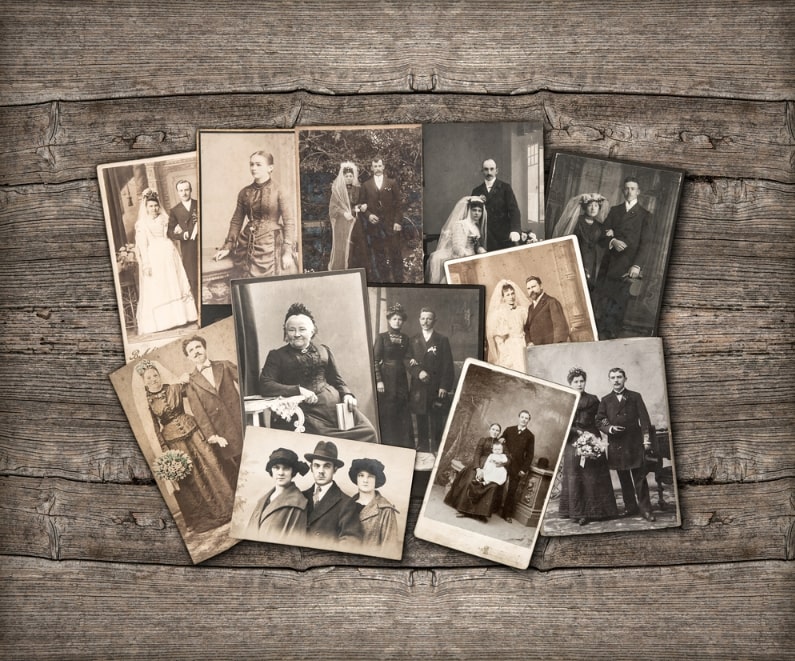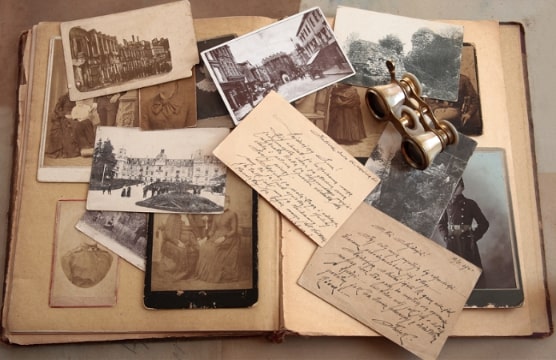Introduction: In this article, Jessica Edwards looks back at her many years exploring her family history and explains why she loves genealogy. Jessica has had a lifelong interest in her family’s history – especially on her father’s side, which goes back to the first settlers in Pennsylvania, Jamestown and New England – and has documented and added more than 30,400 people to her family tree!
Inevitably when I meet someone new and they hear I spend my time doing genealogy I get one of three responses: a rolling of the eyes; a look that seems to ask, “Are you nuts?” or a look of interest. Short of strong-arming them and dragging them to a family history center, the first two reactions lead to my trying to convince them that it is a great hobby. This led to my desire to come up with as many reasons as I could for doing and enjoying genealogy. If you can think of any others, feel free to drop me a line.

Photo credit: https://depositphotos.com/home.html
My first reasons are why I like to do genealogy, and then the rest are reasons given by other people.
(1) I have always had an interest in both sides of my family. My mother’s maternal grandparents came from an area owned at different times by the countries of Poland, Austria, and Hungary. Because these regions were Communist-controlled, little information is available prior to when they came to the United States. My father’s side is the exact opposite, as they settled in what became the United States among the first settlers, and prior to that were fairly well documented. My ex-husband’s family were among the first converts in Scandinavia to the LDS Church, so generations have been following and documenting all of those who came here (difficult and complicated, as many practiced polygamy back in the late 1800s).
I always seemed to have a “need” to belong (probably due to moving a lot as a child). Genealogy helped me to understand more about my ancestors, which also helped me learn more about who I am as a person. It taught me about an inner strength passed down in my families (just looking at all they went through throughout their lives). For example, I have a grandmother who gave birth to one daughter who came down with diphtheria and died in her arms, and then later that same grandmother had a late term miscarriage and a still birth. My two paternal aunts had to step into their mother’s place caring for the family (that included a newborn) when she suddenly died of a cerebral aneurism at age 45. It’s also reassuring that I’m not the only one who has gone through trials and tribulations in my life (or what I thought were such, but when they are compared to what some of my other relatives have gone through, they weren’t so bad after all).
(2) I find the search for documentation a mental challenge – do I have the right person? What can this tell me about who they were? What trials and tribulations did they go through or what great things? Can I find the documentation to support their lives?
(3) What can I learn about the time period they lived in – how they dressed, food they ate, toys and pastimes that kept them occupied when they had free time?
(4) When I was a teenager, I’d mention to my father the name of a boy I had developed a crush on and 99.9% of the time my dad would say, “You can’t date him because he is your cousin,” and I started imaging giving birth to deformed children until I learned to ask him HOW we were related? He’d proceed to tell me how we were related off the top of his head (it was usually 5th cousins or something further away), and I’d reply that’s not a relation! I thought he was joking but I have since learned that he wasn’t and actually could do it all in his head (whereas I have to use my computer and notebooks).
(5) During the period I was getting started with genealogy, a cousin (the child of my mother’s sister) was rushed to the hospital and died in a matter of hours. The doctors found that both his hernia twisted and his intestines developed minute perforations that spilled waste into his abdomen and caused him to develop gangrene and die. I found out that this type of perforation is thought to be genetic, so I decided to do a “medical genealogy” of as many blood relatives as I could gather information on and type it up and keep it in my wallet (his care was delayed because his emergency contact information was in a locked cell phone and outdated by more than 10 years).
By having the copy in my wallet, nursing staff can access it easily (no locking it) and I update it about every six months. I also learned the symptoms and my life was saved as I, too, developed it – but it was caught in time. My “medical genealogy” has also alerted physicians of the prevalence of cancer (many types) and heart problems in my family, so I started having screenings a number of years before the average person and take preventive action to keep from getting anything.
Stay tuned for more reasons!
Explore over 330 years of newspapers and historical records in GenealogyBank. Discover your family story! Start a 7-Day Free Trial
Note on the header image: old photos and correspondence. Credit: https://depositphotos.com/home.html
